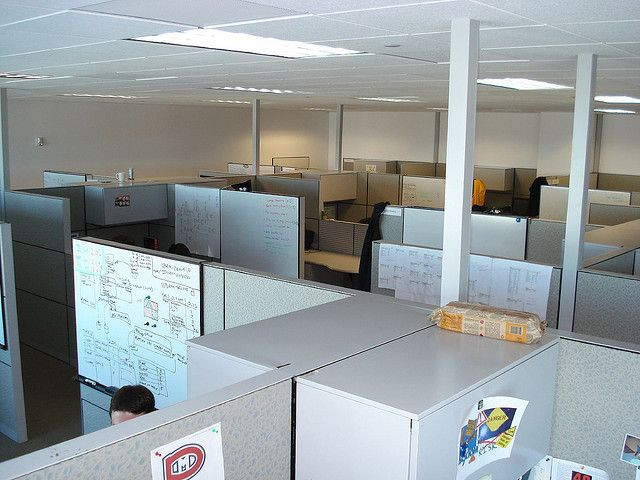Air Quality Of Your Office Space Has A Definite Impact On Your Cognitive Abilities

Think about the office environment for a minute. There are rows and rows of cubicles, windows that haven’t been opened in what is probably decades, and everyone breathing in and out at a constant, relentless rate. As we breathe, simply, we inhale oxygen and exhale carbon dioxide (CO2). In many offices, there are air filters that try and rid the air of CO2, but many of them are probably old and decrepit or just really, really dirty. So, that CO2 that doesn’t get caught in the filter is stuck in the air, and you slowly breathe it in. Though the levels aren’t high enough to kill you, they do make you dumber, finds a new study.
The study, published in Environmental Health Perspectives, found workers showed worsened cognitive function after sitting in their office for several hours, breathing in office air that had normal levels of CO2 and chemicals, as well as an ordinary ventilation system. Using a lab at Syracuse University, researchers switched up the levels of CO2, airborne chemicals, and outside air pumped into the lab as people worked there. The levels were chosen to imitate three different areas: the indoor environment of a regular office building, one that was an LEED Platinum-certified “green” building, and green buildings with an elevated outdoor ventilation rate – dubbed Green+.
Over the course of six days, 24 different occupants — with occupations from architects to engineers — were exposed to varied conditions on different days, but were not informed when any of the changes occurred. At 3p.m. every day, the workers were tasked with completing computer-based cognitive tests of strategy-setting and focus, while the researchers recorded the results as well as the types of air conditions the workers were breathing.
The researchers found the best conditions were those of the simulated air of an extra-ventilated green building. The workers performed 61 percent better breathing in the air of a green building than when breathing in regular air and 101 percent better than when breathing in the Green+ air when compared to regular air.
One of the tests gauged cognitive performance in a crisis, and researchers found that people who were breathing in green air did 97 better than those breathing regular air and 131 percent better when breathing in Green+ air than regular air.
As exciting as the numbers are for the air quality in your office, there are pros and cons. Air quality doesn’t come cheap and cleaning our air uses up a lot of energy. The good news to take away from the study, however, is improving the levels of CO2, volatile organic chemicals, and ventilation is good for employees, good for business, and relatively simple, according to lead author Joseph G. Allen of Harvard's public health school.
Research has begun on a second study that will show how cost effective it is to improve the air quality of an office.
Source: Allen J, et al. Associations of Cognitive Function Scores with Carbon Dioxide, Ventilation, and Volatile Organic Compound Exposures in Office Workers: A Controlled Exposure Study of Green and Conventional Office Environments. Environmental Health Perspectives. 2015.
Published by Medicaldaily.com



























